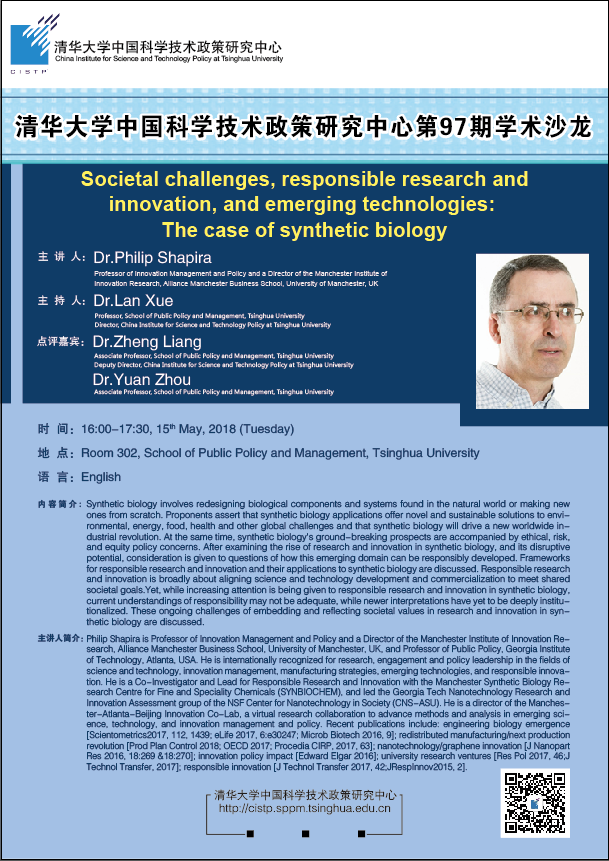Welcome to CISTP'S 97th Academic Salon
Societal challenges, responsible research and innovation, and emerging technologies:
The case of synthetic biology

Lecturer: Dr. Philip Shapira
Professor of Innovation Management and Policy and a Director of the Manchester Institute of Innovation Research, Alliance Manchester Business School, University of Manchester, UK
Host:
Dr.Lan Xue
Professor, School of Public Policy and Management, Tsinghua University
Director, China Institute for Science and Technology Policy at Tsinghua University
Guest:
Dr.Zheng Liang
Associate Professor, School of Public Policy and Management, Tsinghua University
Deputy Director, China Institute for Science and Technology Policy at Tsinghua University
Dr.Yuan Zhou
Associate professor, School of Public Policy and Management, Tsinghua University
Time: 16:00-17:30, 15th May, 2018 (Tuesday)
Place: Room 302, School of Public Policy and Management, Tsinghua University
Language: English
Content about:
Synthetic biology involves redesigning biological components and systems found in the natural world or making new ones from scratch.Proponents assert that synthetic biology applications offer novel and sustainable solutions to environmental, energy, food, health and other global challenges and that synthetic biology will drive a new worldwide industrial revolution. At the same time, synthetic biology’s ground-breaking prospects are accompanied by ethical, risk, and equity policy concerns. After examining the rise of research and innovation in synthetic biology, and its disruptive potential, consideration is given to questions of how this emerging domain can be responsibly developed. Frameworks for responsible research and innovation and their applications to synthetic biology are discussed. Responsible research and innovation is broadly about aligning science and technology development and commercialization to meet shared societal goals. Yet, while increasing attention is being given to responsible research and innovation in synthetic biology, current understandings of responsibility may not be adequate, while newer interpretations have yet to be deeply institutionalized. These ongoing challenges of embedding and reflecting societal values in research and innovation in synthetic biology are discussed.
Lecturer Information:

Philip Shapira is Professor of Innovation Management and Policy and a Director of the Manchester Institute of Innovation Research, Alliance Manchester Business School, University of Manchester, UK, and Professor of Public Policy, Georgia Institute of Technology, Atlanta, USA. He is internationally recognized for research, engagement and policy leadership in the fields of science and technology, innovation management,manufacturing strategies, emerging technologies, and responsible innovation. He is a Co-Investigator and Lead for Responsible Research and Innovation with the Manchester Synthetic Biology Research Centre for Fine and Speciality Chemicals (SYNBIOCHEM), and led the Georgia Tech Nanotechnology Research and Innovation Assessment group of the NSF Center for Nanotechnology in Society (CNS-ASU). He is a director of the Manchester-Atlanta-Beijing Innovation Co-Lab – a virtual research collaboration to advance methods and analysis in emerging science, technology, and innovation management and policy.
Recent publications include: engineering biology emergence [Scientometrics2017, 112, 1439; eLife 2017, 6:e30247; Microb Biotech 2016, 9]; redistributed manufacturing/next production revolution [Prod Plan Control 2018; OECD 2017; Procedia CIRP, 2017, 63]; nanotechnology/graphene innovation [J Nanopart Res 2016, 18:269 &18:270]; innovation policy impact [Edward Elgar 2016]; university research ventures [Res Pol 2017, 46;J Technol Transfer, 2017]; responsible innovation [J Technol Transfer 2017, 42;JRespInnov2015, 2].